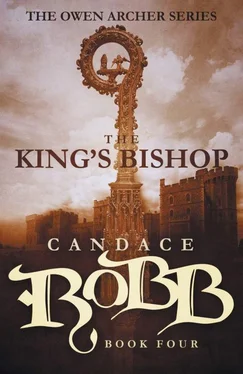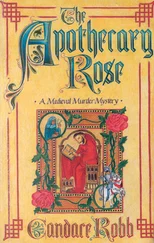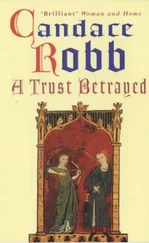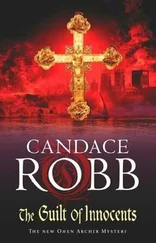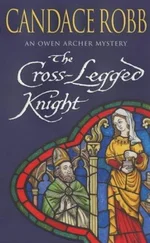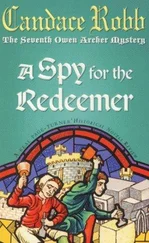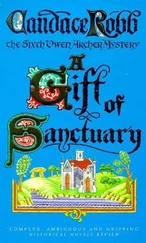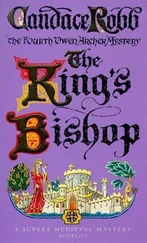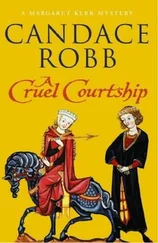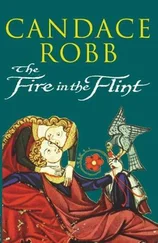The man was obsessed. “This has naught to do with Alice Perrers. Wyndesore is far more a demon than she is.”
Thoresby shook his head. “You are wrong there. It has everything to do with her.”
27
Confessor to the Damned
A chilly dawn rain fell as Wykeham hurried to Winchester Tower in the middle ward. He was acting as confessor to Bardolph and Crofter, condemned for arranging the murders of Daniel and Mary, and carrying out the murders of Don Ambrose, Gervase, and Henry. King Edward thought the councillor’s offer a harmless act of penance for being more disappointed in the outcome of the mission to the Cistercian abbeys than sorry for the deaths. But Wykeham’s motive was morbid curiosity.
To murder three people, arrange for the murders of two others, all for the protection of a lord who, they claimed, knew nothing of these deeds was an act of sublime madness. Had they in good faith believed Wyndesore would wish for such protection? If not, what had inspired such violence? Surely not hatred. They hardly knew their victims. Wykeham could not sleep for the unease the questions aroused.
The guard jerked to his feet, rubbing his eyes, and bowed to Wykeham. He had been nodding, not surprising at this early hour. Wykeham blessed the guard. “I am here as confessor to the two men who are to die tomorrow.”
The guard shook his head. “They be murderin’ thieves, Domine . Have a care.”
As he gingerly descended the narrow stone stairs, Wykeham wondered what lie the guard had been told; the entire business was still shrouded in mystery, the King still insistent that the marriage of Perrers and Wyndesore be kept a secret.
The guard stopped at a heavy door, used a large key to open it. “I shall stand guard, Domine . Call out if they give you trouble.”
Wykeham bowed his tall frame through the low doorway, rose cautiously; his head brushed the ceiling while he yet bent forward. Awkward for a tall man. He wondered who had designed this tower; had it been intended for a prison? Was the low ceiling part of the punishment?
Lifting the lantern to shoulder height, he saw that the condemned men lay at opposite ends of the small room, each asleep on a pile of clean straw. One stirred as the light shone on him. Crofter. The other remained still. A table with two stools stood between them, on it a pitcher and cups, bowls, spoons, and an oil lamp. The men were neither chained nor bound. Wykeham wondered who had seen to their decent treatment – it was comfortable for a dungeon.
“Who goes there?” Crofter demanded, struggling to rise.
“Sir William of Wykeham, come to hear your confession.”
“We have confessed already.”
“I am here to shrive you.”
“The King’s man? Are we such important prisoners, then?”
“All men’s souls are important to the Lord.”
“But not the King? Or is His Grace curious? Wants to hear how we grovel?”
Wykeham paid him no heed; the man had cause to be bitter, taking the blame for crimes he may have been ordered to commit. “You might confess to me in private before your friend wakens.”
“We have no secrets, Bardolph and me.” Crofter glanced towards Bardolph. “Still. He isn’t waking.” He shrugged, rose to his knees, folded his hands. “I confess to those sins for which I stand accused.”
“Do you feel remorse for your sins, Crofter?”
“I do.”
“Then why did you commit them?”
Crofter squinted at Wykeham, puzzled. “I judged it my duty, sir.”
This had been his claim throughout the past days. He never varied in his explanation. “Had Sir William ever ordered you to perform such a task?”
“He knew naught of this. I’ve said that.”
“I understand that Wyndesore knew nothing of your scheme, but were there other occasions when he asked you to risk your salvation? Something to convince you he would condone such a solution?”
Crofter shrugged. “We are soldiers, sir. ’Tis the sort of thing we do. Only difference is whether the Church has blessed the act, seems to me.”
Wykeham crossed himself.
“Ever kill a man, sir?”
“No. God has spared me that need.”
Crofter nodded. “That is why you cannot see it. Duty. A soldier’s duty is to defend by force.”
Wykeham wondered who had put that simple-minded idea in the man’s head. “Your comrade did not appear to agree with you when he begged forgiveness of the Archdeacon of York.”
Crofter shrugged. “Bardolph has ever been a worrier. Not cowardly, mind you. Just thinks too much. Perhaps he asked forgiveness in case we were wrong to protect Sir William in such a way. But you must ask him.” Crofter rose, stooping slightly under the low ceiling, shuffled over to his mate. “Bardolph. Chaplain has come. He’s an important man. He won’t wait.” Crofter shook his inert friend. Bardolph did not move. “Bardolph, did you hear me? Bardolph!”
Alarmed, Wykeham joined Crofter, touched Bardolph’s neck, his wrist, felt no flutter of life. The flesh was cold. He had been a fool not to question the deep sleep. “Has he been ill?”
Crofter met Wykeham’s eyes, shrugged. “He’s been sweating a lot. Wakeful. ’Tis why I was relieved he slept so sound.”
“Sweating and wakeful?”
“Aye. Frightened of dying, frightened of the fires of Hell.” A deep breath. “He’s dead, isn’t he?”
“I fear he is. Though not long dead.” Wykeham shone the lantern on Bardolph, turned his shaggy head this way and that, examined his arms. He saw no obvious signs of violence. The man seemed as if resting peacefully.
But Crofter was too quiet, too calm for a man who had just discovered a friend’s death. Nor would he raise his eyes to Wykeham’s. The privy councillor sent for Owen Archer.
Owen stood at the window staring out between the iron bars to the grey May sky. Rain drummed on the grill; the damp seeped through the chinks in the stone and glistened on the walls like a fine sweat. “I once considered myself exiled.”
“But it is not the same thing at all, is it?” Ned said wearily. “You could return to Wales.”
“What were the odds, eh?”
“As high as the odds of my being pardoned, I suppose.”
Owen turned towards his friend, watched as Ned paced back and forth from corner to corner of the tiny cell, working the stiffness from his joints. Tomorrow he must leave for Dover; he would have three days to make his way there and take ship. After that he was an outlaw, subject to immediate execution if caught in the kingdom. It would be a hard ride, with only enough money to buy his way on to a ship as crew. “From Lancaster’s spy to this. You’ve been a fool, my friend.”
Ned stopped in front of Owen, grabbed his friend’s shoulders, squeezed them. “I did what I felt honour-bound to do. For Mary. I only regret that I involved you and your family. And that the King won’t grant me a few moments at Mary’s grave.”
Owen looked away from the intensely sad eyes. “I tried.”
“I know you did, my friend. I’ll never forget all you’ve done.”
Owen had attempted to sneak Ned out in Alfred’s clothes, but the guards were too well-trained.
“Where will you go?”
“Where the wind takes me.”
Forcing himself to meet his friend’s eyes, Owen clasped Ned’s still upraised arms. “I shall miss you, despite the fool’s chase you led me.”
Their arms fell away.
Ned resumed his pacing. “Neither of her wounds were serious.”
“It was the threat, not the wounds, Ned. And she protested the King’s initial sentence.” The King had ordered Ned beheaded, but Alice Perrers had begged for clemency.
“Aye, she did that. But what of Wyndesore? What will he pay for this?”
Читать дальше
